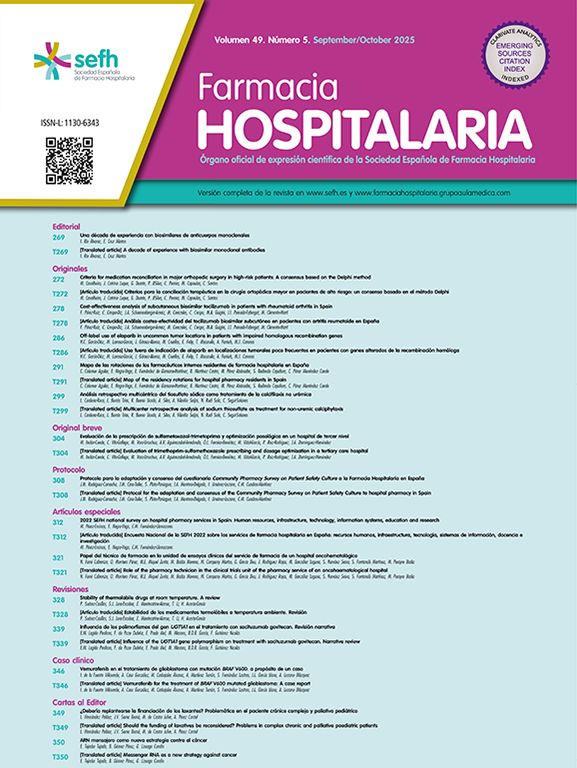To evaluate the incidence of cardiotoxicity associated with treatment with trastuzumab in clinical practice by describing its characteristics, progress, and associated risk factors.
MethodsRetrospective observational study of patients with HER2-positive breast cancer treated with trastuzumab in the first quarter of 2007 in a tertiary hospital. Follow-up was performed from start of treatment until the end of March 2008. The data sources used were the oncological computer program Oncowin® from the pharmacy department and the patient clinical history. We gathered variables related to patient baseline characteristics, treatment, and safety.
ResultsThe study included 61 patients. 19 women (32.8%) presented cardiotoxicity, which was the second most common adverse affect of those frequently attributed to the treatment. The average time for toxicity to appear was 7 months, with an average FEVI decrease of 15.6 (9.1) points. In 63.2% of the patients it was symptomatic, and its most frequent manifestation was stress-induced dyspnoea, with a single case of congestive heart failure. Cardiotoxicity led to suspension of treatment in 22.9% of the total patients, which was definitive for 7 out of the 14 patients who interrupted the treatment. No statistically significant differences were found for the possible risk factors.
ConclusionsThe incidence of cardiotoxicity in clinical practice is much higher than expected. The important clinical implication of this information and the increasing use of trastuzumab mean that there is a new challenge for the optimal treatment of HER2-positive breast cancer.
Evaluar la incidencia de cardiotoxicidad asociada al tratamiento con trastuzumab en la práctica clínica asistencial, describiendo sus características, su manejo y los factores de riesgo asociados.
MétodoEstudio observacional retrospectivo que incluyó a pacientes con cáncer de mama HER-2 positivo en tratamiento con trastuzumab durante el primer trimestre de 2007 en un hospital de tercer nivel. Se realizó un seguimiento desde el inicio del tratamiento hasta finales de marzo de 2008. Las fuentes de datos utilizadas fueron el programa informático de oncología del servicio de farmacia, Oncowin®, y la historia clínica del paciente. Se recogieron variables relacionadas con las características basales del paciente, con el tratamiento y con la seguridad.
ResultadosSe incluyó a 61 pacientes en el estudio; 19 (32,8 %) mujeres presentaron cardiotoxicidad, que supuso el segundo efecto adverso atribuido el tratamiento en frecuencia. La mediana de tiempo de aparición de la toxicidad fue de 7 meses, con un descenso medio de fracción de eyección del ventrículo izquierdo (FEVI) de 15,6 ± 9,1 puntos. En el 63,2 % fue sintomática, la manifestación más frecuente fue la disnea de esfuerzo y hubo un único caso de fallo cardíaco congestivo. La cardiotoxicidad supuso la suspensión del tratamiento en el 22,9% del total de pacientes, y fue de forma definitiva en 7 de las 14 pacientes que interrumpieron el tratamiento. No se hallaron diferencias estadísticamente significativas en cuanto a los posibles factores de riesgo.
ConclusionesLa incidencia de cardiotoxicidad en la práctica clínica asistencial se muestra mucho más elevada que la esperada. Su importante implicación clínica y el uso creciente de trastuzumab hacen que suponga un nuevo reto para el tratamiento óptimo del cáncer de mama HER-2 positivo.
Preliminary results were accepted in poster format at the 53rd National SEFH Congress in Valencia, 2008 (register no. 556).





